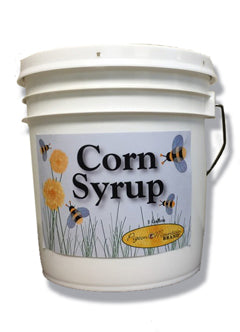
So what’s a beekeeper to do?
Good question.
We’d like to offer you some of the information we have collected over the years, and share with you what we do with our bees. As stated above, we usually keep sugar water for our bees all year long. That’s how we’ve always done it. But that doesn’t mean it’s right for your bees. So here are a variety of options, and you can decide what’s best for you and your hives.
Honey only. This theory proposes that you only take honey out of the hive early, leaving plenty of honey for the bees to eat during the winter. With the decline in bee populations, is this a wise move? What if the honey is weak, and the bees can’t sustain themselves? This might not be a risk to take. But for purists, this is the only way to go.
Sugar/Corn syrup. Several research papers claim that common table sugar is a better winter food for bees than the honey they collect in late fall. Most commercial beekeepers extract all of the fall-season honey and feed their bees sugar syrup to get their bees through the winter. For those of you who depend on honey sales, this might work best for you. It’s important that the syrup is thick. Corn syrup can be fed to the bees straight, so it’s easier to feed. Sugar has to be mixed with water (2:1) but sugar is readily available. Just remember that the thicker the syrup, the more benefit it provides to the bees.
One handy tip when making sugar water: use pints when measuring water, pounds when measuring sugar. If you want 2:1 sugar water, add two pounds of sugar to one pint of boiling water. Boiling the water rids it of microorganisms, making the syrup keep longer. There are lots of options when it comes to feeders as well. Select what will work best for you and your bees.
Don’t do anything. This is the most shocking option you have for over wintering your bees. Don’t over winter them. This seems to go against logic, but there are some ideas to think about. You don’t use supplements, medicines or chemical treatments on your bees, so you can ensure that your honey is chemical-free. You save money because you don’t have to buy medicines. Mites and disease won’t ruin future colonies. You don’t have to replace an old queen. Bees have more time to store and cap honey. You store your equipment in the winter, so it lasts longer. The down side is that you have to store and protect all your drawn frames. You risk not being able to get new package bees every year. The cost of package bees keeps going up. And, you will probably just feel guilty. But if it’s important that you have pure, chemical-free honey and wax, this non-over-wintering could be an option.
Remember, there is no “official” rule book for beekeeping. Ask the experts. Do your research. But what really matters, is what feels and works best for you.
